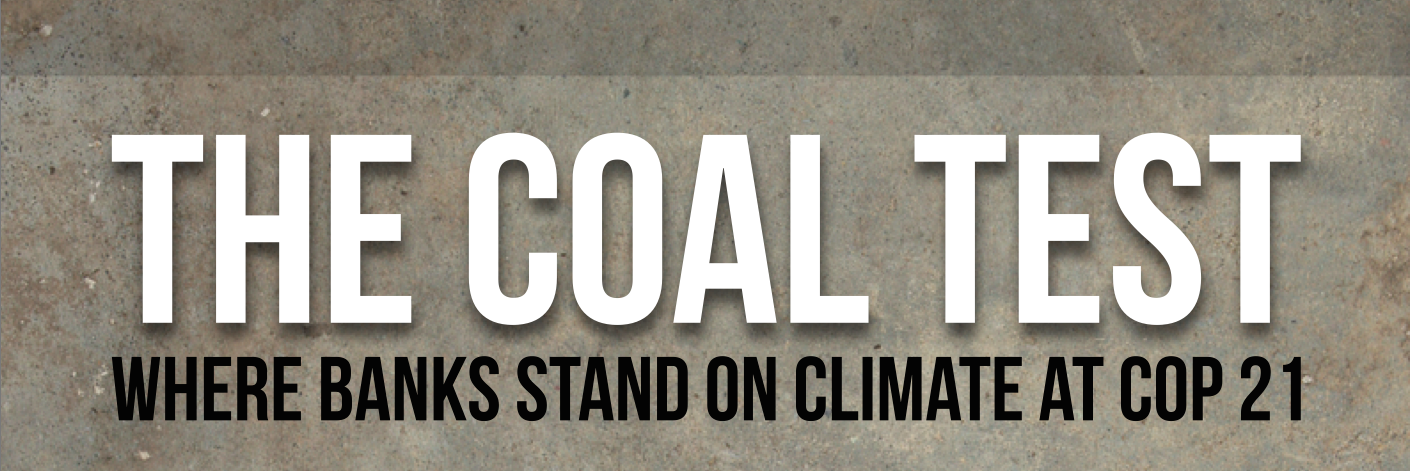EMBARGOED FOR RELEASE: Wednesday 12/2/2015 at 6 AM CET / 12 AM EST
Contact:
Blair FitzGibbon, 1-202-503-6141, blair@soundspeedmedia.com
Ben Collins, Rainforest Action Network, 1-617-697-0277, ben@ran.org
Catalina von Hildebrand, BankTrack, +31 654942649, catalina@banktrack.org
Lucie Pinson, Friends of the Earth France: +33 (0) 6 79 54 37 15, lucie.pinson@amisdelaterre.org
Katrin Ganswindt, urgewald: +49 176 324 111 30, katrin@urgewald.org
Banking Sector’s Climate Leadership Claims Undermined by Coal Billions – New Report
New data benchmarks biggest global banks, finds seven “front runners” but no “true leaders”
Paris – A new report released today analyzes the coal financing of the world’s largest banks. As the UN climate conference convenes in Paris, the report, The Coal Test: Where Banks Stand on Climate at COP 21 finds that seven “front runner” banks have taken recent steps to reduce and stop financing coal mining or coal-fired power. However, coal policies at several other banks fail to adequately address the challenge of climate change, and none of the global banks assessed are considered “true climate leaders,” as not one has yet pledged to end financing for the coal sector entirely.
The report also describes the alarming scale of the banking sector’s support for the coal industry in the years between the Copenhagen and Paris climate summits: $257 billion in coal financing has flowed from big banks between 2009 and 2014. The top five coal-financing banks since COP 15 in Copenhagen are Citigroup ($19.65 billion), JPMorgan Chase ($18.80 billion), Royal Bank of Scotland ($15.86 billion), BNP Paribas ($14.84 billion), and Bank of America ($14.44 billion).
Rainforest Action Network, BankTrack, Friends of the Earth-France, and urgewald released the report as part of the global Paris Pledge campaign, which is calling on banks to end financing for coal.
“In the run-up to Paris we’ve heard many banks insisting that they are leaders on climate,” said Catalina von Hildebrand, Paris Pledge Campaign Coordinator at BankTrack, “as if the $257 billion they’ve poured into dirty coal in the years between the Copenhagen and Paris COPs is an irrelevant accounting error. It’s time they start making amends by dumping coal and rapidly boosting their finance for clean energy.”
“As COP 21 begins, some major European financial institutions have begun to transition away from financing coal mining and power,” said Ben Collins, Senior Campaigner at Rainforest Action Network. “However, Wall Street dominates the top of the list of the world’s biggest coal banks, and it is past time for laggard banks in the U.S. and around the world to cut ties to the fuel.”
The Coal Test analyzes coal policy strengths and weaknesses, highlights where non-committal banks fall short, and spotlights a pervasive lack of climate leadership at the world’s largest banks. The report also compares coal financing commitments from 15 of the world’s biggest private sector banks in France, Germany, Switzerland, the United Kingdom, and the United States.
Katrin Ganswindt of the German NGO urgewald noted: “Even Germany, a country in a remarkable energy transition, has a major climate killer bank ranking in the top 10 coal banks. Deutsche Bank’s dirty coal portfolio is just one of many scandals damaging its reputation.”
Lucie Pinson, campaigner at Friends of the Earth France added: “This year, we have seen some banks, particularly French banks, adopt policies to reduce their coal financing. But while these commitments do not go far enough, several other global banks have yet to commit to reduce their support for coal at all. Banks in France and other countries must recognize that climate science calls on them to cut all, and not just some of their financing for coal. NGOs will continue to monitor energy financing by banks after COP 21 to make sure they shift their financing from coal to renewable energy.”
Catalina von Hildebrand concluded: “With the world convened to take real climate action in Paris, it is urgent that banks demonstrate true leadership on climate and commit to end their financing for coal once and for all.”
